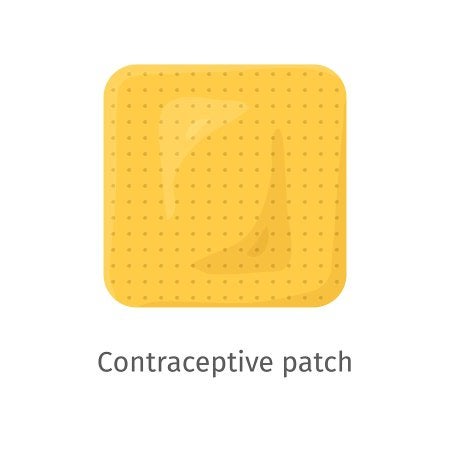-
Is the Birth Control Patch Safe and Effective?
If you are looking for a birth control solution, one option your gynecologist may discuss with you is the birth control patch. The patch works similarly to the birth control pill, but without the need to remember to take it the same time each day.

The patch is an extremely effective method of birth control. Because you apply a patch to your skin and leave it in place for three weeks, it removes most of the risk of using it incorrectly or forgetting to take a pill. Approximately one out of 100 women will become pregnant each year if they use the patch exactly as directed. That number rises to nine in 100 when the patch is not used correctly. It is safe for most women, but it is not ideal for women with migraines with aura, heart valve problems, lupus, or who smoke. Your gynecologist will help you evaluate all of your options for birth control so you can make the best choice for you.
Washington Surgi-Clinic offers comprehensive women’s health services, including gynecological checkups, birth control consultations, and STD testing in Washington, D.C. Call (202) 659-9403 to make an appointment with a provider.
-
A Quick Overview of Pap Smears
Having a regular Pap smear is an important part of preventative healthcare for women. The test is performed by your gynecologist and takes just minutes. This video explains more about the process.
During a Pap smear, your gynecologist will remove a sample of cells from your cervix with a small brush. These cells are screened for abnormalities that could indicate cancer. The test is performed in the doctor’s office and does not require any anesthesia. Mild discomfort is possible for a few seconds when your gynecologist brushes the cervix, but it resolves immediately after the test.
At Washington Surgi-Clinic , we offer comprehensive gynecology services in Washington, D.C. with a complete commitment to patient confidentiality. To make an appointment with a gynecologist today, please call (202) 659-9403.
-
Is a Nonsurgical Pregnancy Termination Right for You?
If you choose to have a pregnancy termination during the first trimester, a nonsurgical abortion, also called a chemical abortion, may be an option for you. There are several different factors involved in choosing the right method of termination, and your gynecologist can help you decide which option is the best for your situation. Here is a look at nonsurgical pregnancy termination and some signs that it could be the right choice for you.

What is nonsurgical pregnancy termination?
Nonsurgical termination uses medications to end the pregnancy rather than a surgical procedure. There are a few different medications your gynecologist can use, depending on the stage of your pregnancy. They can be administered orally, vaginally, or via an injection, and typically, the medications are taken in two parts. You will take the first medication at your doctor’s office and then take the second at home days later, as prescribed by your doctor. After taking the dose of medication at home, you will experience cramping as the fetus is expelled. About a week after taking the second dose of medicine, your gynecologist will perform an exam to ensure the abortion is complete.
Who can have a nonsurgical termination?
Nonsurgical termination is only used for first-trimester abortions in pregnancies less than six weeks old according to menstrual age. Menstrual age, also sometimes called gestational age, is the duration of the pregnancy measured from the first day of your last period. This is different from the conceptional age, which measures the length of your pregnancy starting from the time of conception.
Who is not a good candidate for nonsurgical termination?
Anyone further along in her pregnancy than six weeks cannot have a nonsurgical termination. Women who are anemic or who have liver, kidney, bowel, or seizure disorders may not be able to have non-surgical termination, as it could cause dangerous complications. Your gynecologist will consider your medical history when recommending the right procedure to you.
Get the information you need about your abortion options at Washington Surgi-Clinic. We offer safe and confidential first and second trimester abortions in Washington, D.C. , with complete support throughout the process. Make an appointment by calling (202) 659-9403.
-
How to Talk to Your Teenage Daughter About Sexual Health
Mothers play a central role in shaping their daughters’ knowledge of and attitudes about sexual health. Having the talk isn’t always easy, but it is important. By having open communication with your daughter, you can help her protect herself from STDs and unwanted pregnancies and see going to the gynecologist for checkups as a normal part of well-being. Although the conversation can be tricky, these tips will help you get started.

Don’t Wait for the Right Moment
There is no perfect time to start talking to your teen about sexual health. Instead of waiting for the exact right moment, seize on opportunities that arise. Something on a television show or movie or a snippet of an overheard conversation can be all that you need to broach the subject. Your daughter may be resistant to having the conversation, but the message you want to deliver will still get through. Keep bringing up the subject when you see an opportunity, as sexual health should be an ongoing conversation as your teen daughter grows.
Get Real About the Pressures
You may not want to think about the pressures your teen is likely to be facing, but ignoring them could put your daughter at risk. Be upfront and honest as you discuss issues of sexual activity, STDs, and birth control pills. Tell your daughter how to protect herself and how to get help if she thinks she needs STD testing or could have an unwanted pregnancy.
Involve a Gynecologist
Your daughter should have her first gynecology checkup by age 18—or earlier, if she is sexually active. Help your daughter find a gynecologist she feels comfortable talking to, and give her the freedom to talk to the doctor on her own about her sexual health concerns.
The compassionate team at Washington Surgi-Clinic offers supportive care to women of all ages for everything from Pap smears to STD treatment and pregnancy termination in Washington, D.C. For an appointment, please call (202) 659-9403.
Recent Posts
Popular Posts
categories
- Uncategorized
- STD
- Washington Surgi-Clinic
- Abortion
- Pregnancy
- Pap Smears
- Birth Control Options
- HPV
- Gynecologist
- Pregnancy Test
- Abortion Safety
- IUD
- Pregnancy Termination
- First Trimister
- Cervical Cancer
- Morning After Pill
- Birth Control Pills
- Chlamydia
- Birth Control Shot
- Gonorrhea
- STD Testing
- Birth Control Implant
- Pelvic Pain
- Birth Control Patch
- HIV
- HPV Vaccine
